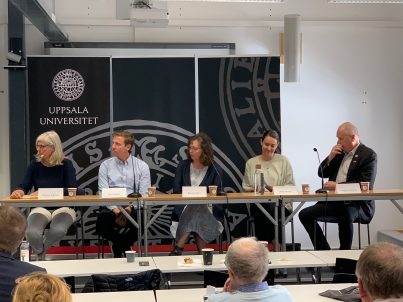I am looking for information as
Researcher

Industry

Patient

BIOBANK SWEDEN AT ALMEDALEN WEEK
The Swedish Research Council-funded research infrastructure Biobank Sweden supports healthcare providers and universities with medical faculties working towards national harmonization in biobanking.
Biobank Sweden participated in Almedalen Week 2019, a long-running political festival and forum in Visby, on the Swedish island of Gotland. On July 4, Biobank Sweden organized a seminar in cooperation with Uppsala University, entitled Why aren’t biobank samples used more frequently to improve public health?
Sonja Eaker Fält (PhD), chair of Biobank Sweden’s National Advisory Board, opened the event by discussing the background to this question. She especially emphasized that actively using biological samples and health data is necessary in order to generate new screening methods and improving diagnostics.
In spite of these potential gains, issues like connecting sample information with other health data and dealing with patient consent, present major challenges in Sweden. More than 150 million samples are stored in Swedish biobanks, and the annual growth equals approximately 3 million samples. These samples are a unique resource for research, but there are numerous organizational, technical and legal obstacles preventing their use.
The introduction was followed by a lively panel discussion on the topic of how Sweden should tackle these obstacles. The seminar’s expert panel consisted of Karolina Antonov, Head of Strategy at LIF Sweden, Eskil Degsell, patient relative representative at the Swedish Brain Tumor Association, Beata Ferencz, patient relative representative at Rare Diseases Sweden, Beatrice Melin, professor at Umeå University, and National Government Life Science Coordinator Anders Lönnberg.
They stressed the importance of moving forward and challenging current boundaries and hurdles. Hoarding biobank samples is of no help to the group that would benefit the most from increased research opportunities – the patients. When it comes to improving the conditions for biobank research using both samples and health data, the panelists agreed that targeted, strategic efforts on the national level are an absolute prerequisite. A nationally implemented system for informed consent would be a crucial first step.






